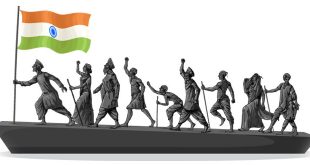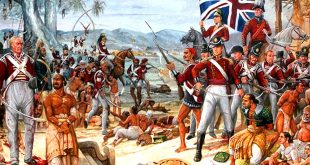Question: Give two reasons why Indian textiles were renowned all over the world. Answer: Their fine quality and beautiful craftsmanship made them renowned all over the world. Question: Why were printed Indian cotton textiles I popular in England? Answer: Printed Indian cotton textiles were popular in England for their exquisite …
Read More »Search Results for: Gandhi
NCERT 8th Class (CBSE) Social Science: The National Movement: Second Phase – Quiz
NCERT 8th Class (CBSE) Social Science: The National Movement: Second Phase – Quiz 8 Multiple Choice Questions related to NCERT 8th Class (CBSE) Social Science: The National Movement: Second Phase – Quiz: Mahatma Gandhi advocate ‘satyagraha’ to fight the british. His early campaigns were at Champaran, Ahmedabad and Kaira (Kheda). …
Read More »NCERT 8th Class (CBSE) Social Science: India After Independence – Quiz
NCERT 8th Class (CBSE) Social Science: India After Independence – Quiz 13 Multiple Choice Questions related to NCERT 8th Class (CBSE) Social Science: India After Independence – Quiz: The Indian Constitution was adopted on 26 January, 1950. Nathuram Godse disagreed with Gandhiji’s conviction that Hindus and Muslims should live together …
Read More »NCERT 8th Class (CBSE) Social Science: India After Independence
Question: When was the Indian Constitution adopted? Answer: The Indian Constitution was adopted on 26 January, 1950. Question: Which step has been described as revolutionary? Answer: All Indians above the age of 21 would be allowed to vote in state and national elections. Question: On what point did Nathuram Godse …
Read More »NCERT 8th Class (CBSE) Social Science: The National Movement: Second Phase
Question: What do you know about early life of Gandhiji? Answer: The national movement entered a new phase after the arrival of Gandhiji on 2 October 1869 at Porbandar (Gujarat), he received his early education in India. Later, he went to South Africa to practice law. During his stay these he …
Read More »NCERT 8th Class (CBSE) Social Science: The National Movement: First Phase
Question: What factors resulted in growing opposition to British rule? Answer: All these factors resulted in growing opposition to British rule: All the section of society suffered under British rule. The peasant had to pay high taxes. The artisan was ruined by foreign competition. The factory worker received very low …
Read More »NCERT 8th Class (CBSE) Social Science: Education And British Rule
Question: Name the different languages that William Jones studied. Answer. Greek, Latin, English, French, Arabic and Persian. Question: Why was Calcutta Madrasa set up? Answer: Calcutta Madrasa was set up to promote the study of Arabic, Persian and Islamic law. Question: Why was the Hindu College established in Benaras? Answer: …
Read More »NCERT 6th Class (CBSE) Social Science: What is Government? – Quiz
NCERT 6th Class (CBSE) Social Science: What is Government? – Quiz 15 Multiple Choice Questions related to NCERT 6th Class (CBSE) Social Science: What is Government? – Quiz: The government works at the local level, at the state level and at the national level. Monarchy is a form of government …
Read More »NCERT 6th Class (CBSE) Social Science: What is Government?
Question: Name some institutions that are part of the government. Answer: The Supreme Court, the Indian Railways, Bharat Petroleum. Question: List any two functions of the government. Answer: The government protects the boundaries of the country. It maintains peaceful relations with other countries. Question: What happens when someone commits a crime? …
Read More »NCERT 7th Class (CBSE) Social Science: The Human Environment: Settlement, Transport and Communication
Question: What do you understand by the term human settlement? How did settlements emerge? Answer: Human settlements refer to the locations where people build their homes. Around these settlements human communities develop. A community is a group of people living in a particular area and bound by a common culture …
Read More » Class Notes NCERT Solutions for CBSE Students
Class Notes NCERT Solutions for CBSE Students





